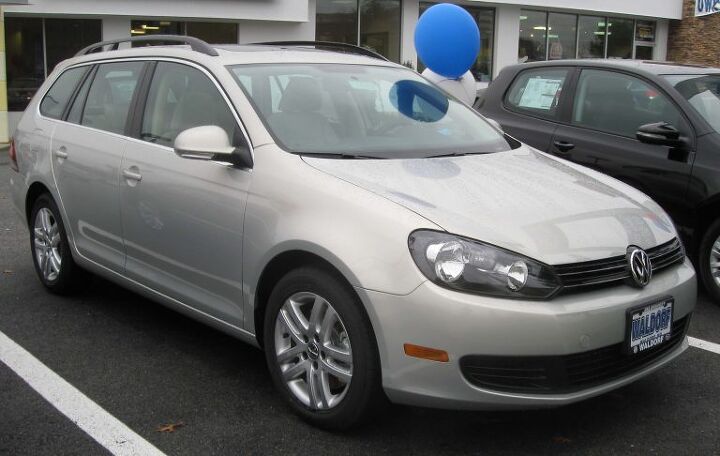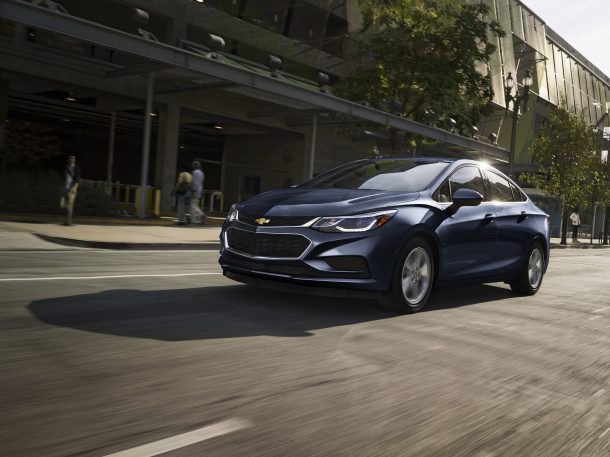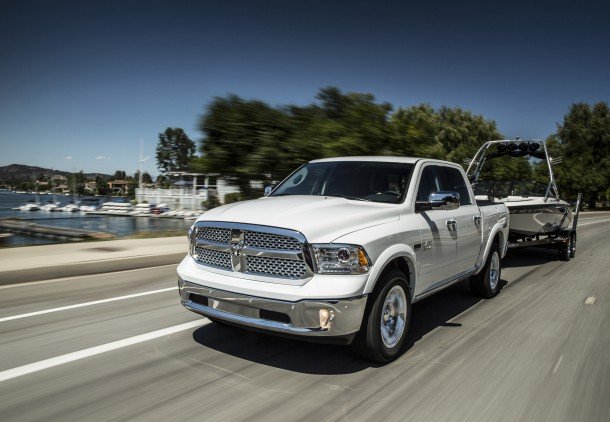#Diesel
Audi Boots Top Engineers After One Accuses CEO of Involvement in Diesel Deception
Audi appears to be going on the defensive and closing ranks around its CEO following a tumultuous week filled with accusations and revelations.
Late last week, the automaker fired four top engineers who worked on the brand’s diesel technology, including head of engine development Ulrich Weiss. Germany’s Handelsblatt reports that Weiss, who has been on paid leave since the diesel emissions scandal erupted, presented documents in court that appeared to show CEO Rupert Stadler had knowledge of the defeat devices as early as 2012.
Audi is now seeking charges against one or more individuals for “baseless accusations,” as well as revealing internal documents. Unfortunately for the automaker, another German media outlet has gotten its hands on an infamous PowerPoint presentation.
The Early 1980s Are Back! GM Anticipates Big Demand for Diesels
Volkswagen’s emissions scandal may have killed that company’s diesel presence in North America, but it didn’t kill demand for diesel engines in general — especially ones that don’t pollute like Chernobyl and end up in the trash heap.
At least, that’s General Motors’ take on it. The automaker hopes to fill the void created by VW’s oil-burning absence and, in doing so, score some points with the EPA. With diesel engines now available in five vehicles you won’t see on a worksite (and five more that you would), GM has high hopes it can erase memories of its 1980s diesel woes.
No (Four) Pot of Gold: Some Volkswagen Diesel Owners Are Stuck Between Borders
U.S. owners of illegally polluting Volkswagen diesels have already flown to sunny vacation spots or picked up a new vehicle with the help of buyback and compensation checks. North of the border, over 100,000 Canadians who own a 2009-2016 TDI model are waiting for their cut of a $2.1 billion settlement.
However, Volkswagen’s “we’re sorry” gravy train isn’t rolling into everyone’s driveway. Some owners are finding that their vehicles are stuck in a cross-border limbo.
Chevrolet Cruze Diesel Captures All the MPGs, on the Highway at Least
General Motors’ PR team and ad writers basically have their taglines and talking points written for them now that the Environmental Protection Agency has released fuel economy ratings for the 2017 Chevrolet Cruze Diesel.
Rumblings from inside the Renaissance Center late last year caused much speculation as to the oil-sipping model’s thriftiness, and we were told GM was shooting for a 50 mile-per-gallon highway rating.
As it turns out, the Cruze crested that bar with room to spare.
Finally, an Automotive Scandal is Compared to Horse Meat Lasagna
Three German judges claim that Volkswagen’s actions leading up to the diesel emissions scandal was akin to putting horse meat in lasagna.
Bloomberg reports that the comparison was made when a court in Hildesheim ordered the car manufacturer to buy back someone’s Skoda Yeti at full sticker price. The ruling was warranted, as VW intentionally committed fraud, the court said.
Justice Department Launches Criminal Investigation Into Fiat Chrysler's Diesel Devices
Fiat Chrysler Automobiles started off the week in solid form. It deftly preempted the Detroit auto show by unveiling its futuristic Portal minivan concept at the youthful Consumer Electronics Show a week prior, then dangled a big Mopar tease in front of enthusiasts with its yet-to-be-revealed SRT Hellcat Demon variants of the Dodge Charger and Challenger.
Then, just like that, the Environmental Protection Agency held a media conference and FCA found its legs kicked out from under it. After Thursday’s accusation of emissions violations (via eight undeclared emissions control devices found on 3.0-liter EcoDiesel models), the automaker finds itself playing defense as controversy grows.
As the EPA’s investigation continues, the U.S. Department of Justice has now opened a criminal probe.
Sergio Vs. Schneiderman: New York A.G. Dives Into the Fiat Chrysler Emissions Controversy
Well known as a leading voice in the fight against climate change and a host of other progressive issues, New York Attorney General Eric Schneiderman now has Fiat Chrysler Automobiles in his sights.
After yesterday’s bombshell announcement from the Environmental Protection Agency, in which the regulator accused FCA of violating federal laws with its 3.0-liter diesel Jeep and Ram models, Scheiderman revealed that his office will investigate the automaker.
A noted environmental attack dog, Schneiderman isn’t the guy you want on your tail.
Sergio Calls EPA Accusation 'Hogwash,' But Here's What It Could Cost FCA
The Environmental Protection Agency calls the emissions control devices found on diesel Jeep and Ram vehicles a “clear and serious violation of the Clean Air Act” — something the CEO of Fiat Chrysler Automobiles isn’t very happy about.
In their morning announcement, EPA officials claimed the automaker hasn’t done anything to prove the devices found on 2014-2016 EcoDiesel models aren’t regulator-tricking “defeat devices.” According to Brent Snavely of the Detroit Free Press, Sergio Marchionne is mighty steamed, calling the insinuation of cheating “unadulterated hogwash.”
So, what are these eight auxiliary devices, and what penalty could the automaker face if found in violation of the law?
BREAKING: EPA Accuses Fiat Chrysler of Emissions Cheating; Over 100,000 Ram, Jeep Vehicles Implicated
The Environmental Protection Agency has accused Fiat Chrysler Automobiles of installing emissions software in 104,000 diesel Rams and Jeeps that violates the Clean Air Act.
According to the regulator, which made its announcement this morning, FCA failed to declare “eight auxiliary emissions control devices” during the EPA certification process. Those devices were installed on 2014, 2015 and 2016 Jeep Grand Cherokee and Ram 1500 vehicles equipped with the 3.0-liter EcoDiesel V6 engine.
The regulator has sent a notice of violation to the automaker.
Six Volkswagen Executives Indicted by Department of Justice
The United States has now laid charges against six former or current Volkswagen officials for their role in the diesel emissions scandal.
A federal grand jury in the Eastern District of Michigan returned an indictment today, fingering the execs for playing key roles in a decade-long conspiracy to deceive the U.S. government and public. While five of the men live in Germany, one man — Oliver Schmidt, former head of VW’s regulatory compliance department — was nabbed by the FBI in a Miami airport on Saturday while attempting to return to Germany.
As the charges were handed down, the embattled automaker pleaded guilty to three criminal federal counts and agreed to pay $4.3 billion in criminal and civil penalties.
Volkswagen's U.S. Emissions Man Nabbed in Florida, Slapped With Conspiracy Charges
A Volkswagen executive who allegedly spent more than a year throwing up smoke screens around the emissions-cheating automaker has been arrested in sunny Florida.
Oliver Schmidt, a former top emissions compliance manager assigned to the U.S., ran defense for the company in the long run-up to the diesel revelations. As allegations mounted and regulators began asking questions, Schmidt and other company officials blamed phony technical problems for the sky-high emissions levels seen during real-world testing.
According to the New York Times, Schmidt, a German national, was nabbed on Saturday and charged by the FBI with conspiracy to defraud the U.S.
NAIAS 2017: Redesigned 2018 GMC Terrain Shows Up in Detroit With Diesel Power
GMC rolled out a redesigned 2018 Terrain SUV at the North American Auto Show in Detroit, with the usual promises of added refinement, new electronic convenience and safety features, and greater versatility. But GMC also added one feature not commonly found in an SUV, particularly one of the non-behemoth variety: An available diesel engine.
The diesel Terrain gets a 137-horsepower 1.6-liter turbodiesel with 240 lb-ft of torque matched with a six-speed automatic transmission. Gasoline powertrains include a 170-hp 1.5-liter turbocharged four-cylinder and a 252-hp 2.0-liter turbocharged four cylinder, both with direct injection and paired with a nine-speed automatic.
Volkswagen Can Save 70,000 TDI Vehicles, If Their Owners Want It
Assuming owners of 2.0-liter diesel Volkswagens aren’t so pissed at the company that thoughts of cash extraction and corporate punishment fill their every waking hour, up to 70,000 of the little polluters could be spared.
After failing multiple times to whip up a fix for the emissions-rigged engines, VW has made a breakthrough with the U.S. government. That means owners of certain VW and Audi vehicles have a choice to make.
Germany Finally Gets in on the Diesel Action With Its Own Compensation Lawsuit
A lawsuit has been filed in Germany against Volkswagen in the hopes of forcing the automaker to buy back emission-cheating cars in Europe in the same manner it was ordered to in the United States.
The suit, filed today by a solitary vehicle owner, will become the test case for thousands of other European claimants and aims to put pressure on VW to compensate continental customers for the ongoing emissions scandal.
Piston Slap: Is VW's Emissions Scandal Saving or Killing TDI Culture?
TTAC regular David Holzman writes:
My brother and several of my friends are wondering what to do about their TDIs. There are probably hundreds of thousands more like them! Some issues with keeping them:
- Will they actually be forced to clean up the emissions? (I think this may depend on which state they’re in, but I’m not sure.)
- How much will the fix affect gas mileage and performance?
- Will the fix be a PITA after it’s installed? If so, how so?
- After all the above is considered, what’s the cost/benefit of keeping the TDI vs taking the money and getting a new car?
- Is there any reason not to simply wait and see how the fix works out and not rushing to take the buy out?
For my brother, sportiness is not a priority, but having a wagon is. As is reliability and having a very similar car so that his wife, who does not adapt easily to different cars and drives the TDI exclusively, will be happy. But I think VW has discontinued Jetta wagons, and the latest generation of Golf (which has a wagon) gets lousy marks for reliability from CR. In particular, they consider some fuel system problems to be “fairly serious.”
All the best,
David





























Recent Comments